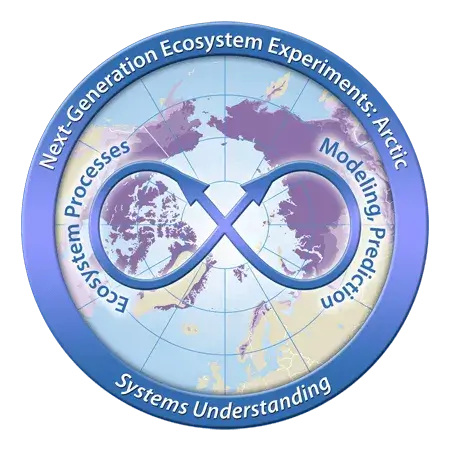Rogers, Alistair, et al. “Triose Phosphate Utilization Limitation: An Unnecessary Complexity in Terrestrial Biosphere Model Representation of Photosynthesis”. New Phytologist, 2021, https://doi.org/10.1111/nph.17092.
Publications
Displaying 61 - 76 of 76
By year of publication, then alphabetical by title
- Ladd, Mallory P., et al. “Untargeted Exometabolomics Provides a Powerful Approach to Investigate Biogeochemical Hotspots With Vegetation and Polygon Type in Arctic Tundra Soils”. Soil Systems, vol. 5, no. 1, 2021, p. 10, https://doi.org/10.3390/soilsystems5010010.
- Debolskiy, Matvey V., et al. “Water Balance Response of Permafrost-Affected Watersheds to Changes in Air Temperatures”. Environmental Research Letters, vol. 16, no. 8, 2021, p. 084054, https://doi.org/10.1088/1748-9326/ac12f3.
- McGuire, David, et al. “An Assessment of the Carbon Balance of Arctic Tundra: Comparisons Among Observations, Process Models, and Atmospheric Inversions”. Biogeosciences, vol. 9, no. 8, 2012, pp. 3185-04, https://doi.org/10.5194/bg-9-3185-201210.5194/bg-9-3185-2012-supplement.
- Lewis, K. C., et al. “Drainage Subsidence Associated With Arctic Permafrost Degradation”. Journal of Geophysical Research, vol. 117, no. F4, 2012, https://doi.org/10.1029/2011JF002284.
- Lee, Hanna, et al. “Enhancing Terrestrial Ecosystem Sciences by Integrating Empirical Modeling Approaches”. Eos, Transactions, American Geophysical Union, vol. 93, no. 25, 2012, pp. 237-, https://doi.org/10.1029/2012EO250008.
- McCarthy, Heather R., et al. “Integrating Empirical-Modeling Approaches to Improve Understanding of Terrestrial Ecology Processes”. New Phytologist, vol. 195, no. 3, 2012, pp. 523-5, https://doi.org/10.1111/j.1469-8137.2012.04222.x.
- Graham, David E., et al. “Microbes in Thawing Permafrost: The Unknown Variable in the Climate Change Equation”. The ISME Journal, vol. 6, no. 4, 2012, pp. 709-12, https://doi.org/10.1038/ismej.2011.163.
- Xu, Chonggang, et al. “Toward a Mechanistic Modeling of Nitrogen Limitation on Vegetation Dynamics”. PLOS ONE, vol. 7, no. 5, 2012, p. e37914, https://doi.org/10.1371/journal.pone.0037914.
- Bouskill, Nicholas J., et al. “Trait-Based Representation of Biological Nitrification: Model Development, Testing, and Predicted Community Composition”. Frontiers in Microbiology, vol. 3, 2012, https://doi.org/10.3389/fmicb.2012.00364.
- Hanson, Paul J., et al. “A Method for Experimental Heating of Intact Soil Profiles for Application to Climate Change Experiments”. Global Change Biology, vol. 17, no. 2, 2011, pp. 1083-96, https://doi.org/10.1111/gcb.2010.17.issue-210.1111/j.1365-2486.2010.02221.x.
- Xu, Chonggang, et al. “Importance of Feedback Loops Between Soil Inorganic Nitrogen and Microbial Communities in the Heterotrophic Soil Respiration Response to Global Warming”. Nature Reviews Microbiology, vol. 9, no. 3, 2011, pp. 222-, https://doi.org/10.1038/nrmicro2439-c1.
- Frampton, Andrew, et al. “Non-Isothermal, Three-Phase Simulations of Near-Surface Flows in a Model Permafrost System under Seasonal Variability and Climate Change”. Journal of Hydrology, vol. 403, no. 3-4, 2011, pp. 352-9, https://doi.org/10.1016/j.jhydrol.2011.04.010.
- Koven, Charles D., et al. “Permafrost Carbon-Climate Feedbacks Accelerate Global Warming”. Proceedings of the National Academy of Sciences, vol. 108, no. 36, 2011, pp. 14769-74, https://doi.org/10.1073/pnas.1103910108.
- Wullschleger, Stan D., et al. “Planning the Next Generation of Arctic Ecosystem Experiments”. Eos, Transactions, American Geophysical Union, vol. 92, no. 17, 2011, p. 145, https://doi.org/10.1029/2011EO170006.
- Rowland, Joel C., et al. “The Role of Advective Heat Transport in Talik Development Beneath Lakes and Ponds in Discontinuous Permafrost”. Geophysical Research Letters, vol. 38, no. 17, 2011, https://doi.org/10.1029/2011GL048497.

